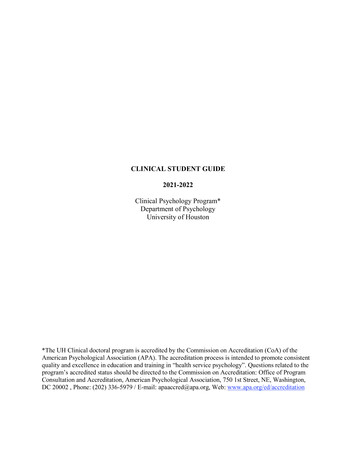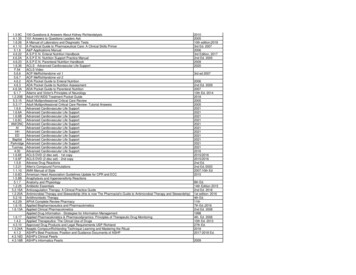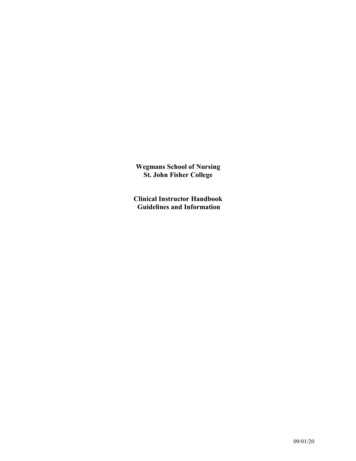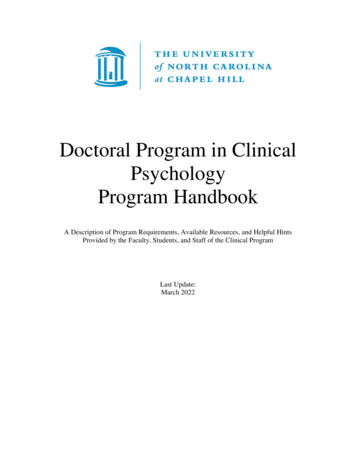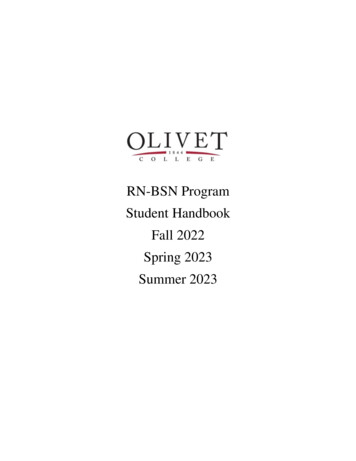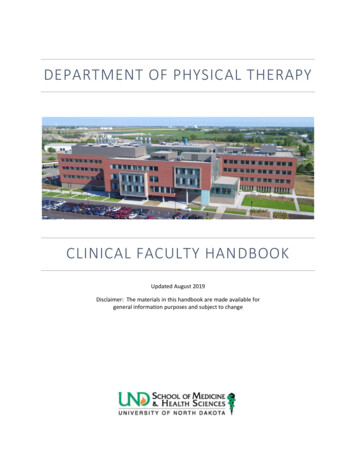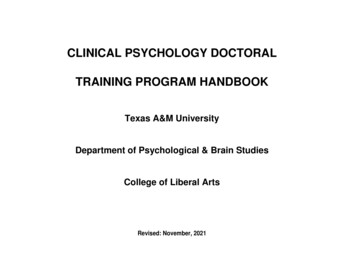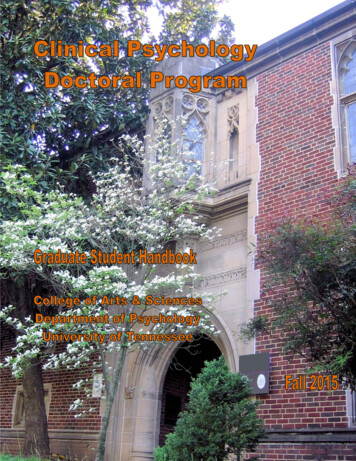
Transcription
TABLE OF CONTENTSI. I. Director of Clinical Training Welcome Statement 3II.Graduate School Introduction. . . 3III.Introduction to the Clinical Program . .3A. Introduction to Clinical Faculty and Staff . . . .4IV.Objectives. 9V.Admissions Requirements and Application Procedures . 9A. Student Selection Process . 9B. Academic Preparation and Admission Requirements . 10VI.Funding. 10VII. Registration and Advising . 11A. Registration .11B. Advising . . .11VIII. Clinical Psychology Doctoral Program Overview . 12A. Fieldwork. 13B. Mentoring: Fostering Professional Identity . 13IX.Clinical Psychology Doctoral Program Requirements . 14A. Coursework . 15B. Apprenticeship . 15C. Thesis/Predissertation Research Requirement . . . .15D. Clinical Practicum. 17E. Doctoral Committee . 17F. Comprehensive Exam (PRIP) . 19G. Dissertation Proposal . 19H. Admission to Candidacy . 19I. Internship . 20J. Leave of Absence for Internship . 20K. Dissertation Research . 20L. Oral Defense of Dissertation . 21X.Standards, Problems and Appeals . 21A. Time Limit . 21B. Grading . 21C. Ethical Behavior . 22D. Evaluation . 22E. Probation and Termination. 23F. Leave of Absence for Medical/Personal Reasons . 23G. Grievance Procedures . 24XI.Pertinent Graduate Student Web Pages . 25LIST OF APPENDICES . 26LIST OF FORMS . 702
I.WELCOME STATEMENTThe Department of Psychology and the doctoral program in Clinical Psychology welcomes youto graduate study at the University of Tennessee-Knoxville. We are excited and honored thatyou chose to attend our graduate program. From the outset we hope that you will appreciate thatgraduate education involves an open and collegial relationship between faculty and studentswho share responsibility for the learning process. This Handbook presents a summary of theclinical program, psychology department, and university requirements for obtaining the doctoraldegree. You should review the Handbook throughout the course of your study and be familiarwith its contents throughout your tenure in the clinical program. While graduate education is ahighly rewarding experience, it also presents unique challenges. We strongly encourage you toseek guidance from your mentors, directors, and department head if you have any questionsabout the program, degree requirements, and how to manage the various aspects of graduatelife. Again, we welcome you to UT and wish you the best during your graduate education.Todd M. Moore, Director of Clinical TrainingII.GRADUATE SCHOOL INTRODUCTIONIn order to serve the mission and vision of the Graduate School and preserve the integrity of GraduatePrograms at the University of Tennessee, Knoxville, information related to the process of graduateeducation in each department is to be provided for all graduate students.Based on Best Practices offered by the Council of Graduate Schools, it is important that detailed articulationof the information specific to the graduate degrees offered in each department/program be disseminated.The Department Graduate Handbook does not deviate from established Graduate School Policieshttp://catalog.utk.edu/content.php?catoid 12&navoid 1061 noted in the Graduate Catalog, but ratherprovides the specific ways in which those policies are carried out.III.INTRODUCTION TO THE CLINICAL PROGRAMThe Clinical Psychology Program of the University of Tennessee Knoxville has been fully accredited by theAmerican Psychological Association since 1949. Our program is designed to train highly competent clinicalpsychologists who will make significant contributions to the profession and society as researchers, teachers,and clinicians.We follow the Tennessee Model, which represents a set of guidelines through which students are trained tothink of psychological practice and research as similar enterprises to be conducted in an integrated mannerensuring maximum benefit in both domains. Our students receive strong training in research, psychologicalassessment, psychotherapy, and teaching. Our faculty approach clinical work from a variety of theoreticalperspectives including psychodynamic, cognitive behavioral, emotion-focused and systemic.3
Dr. Todd Moore (tmoore24@utk.edu) is the Director of Clinical Training. Dr. Moore’s office islocated in 416F Austin Peay.I have three related research areas: the relationship betweensubstance use and intimate partner violence, risk factors for relapseto substance use, and the impact of gender role stress on men'shealth and behavior. My research on substance use and violencefocuses on better understanding the role that alcohol and variousdrugs may play in increasing the risk for violence between intimatepartners.Dr. Jenny Macfie (macfie@utk.edu) is the Associate Director. Dr. Macfie’s office is located in 310EAustin Peay.I work within a developmental psychopathology framework at theintersection of clinical and developmental psychology. I am interested inthe development of adult psychopathology that has strong conceptuallinks to early childhood development. Specifically I focus on thedevelopmental tasks of attachment, self-development and self-regulation.I am currently studying development in children (age 4-6 and 14-17)whose mothers have borderline personality disorder (BPD).4
Dr. Jennifer Bolden (jbolden2@utk.edu). Dr. Bolden’s office is located in 303A Austin Peay.Contributing to existing knowledge of developmentalpsychopathology with emphasis on improving both learning andbehavior is the central focus of my research program.Specifically, I am interested in understandingneuropsychological correlates of attention, learning, anddisruptive behavior problems in children to inform psychologicalscience and evidence-based practices.Dr. Chris Elledge (lelledge@utk.edu) Dr. Elledge’s office is located in 301F Austin PeayMy program of research focuses on understanding how aspects ofchildren’s relationships with parents, siblings, and peers lead to, sustain,or exacerbate dysfunctional behavior in youth. I have particular interest inidentifying relationship characteristics and interpersonal processes thatconfer developmental risk or protection for aggressive and bulliedchildren and developing preventative intervention strategies thateffectively enhance these children’s social contexts and interpersonalrelationships toward reducing later dysfunction.Dr. Derek Hopko (dhopko@utk.edu). Dr. Hopko’s office is located in 301D Austin Peay.My research and clinical interests involve the behavioral assessment andtreatment of individuals with mood and anxiety disorders. Morespecifically, I conduct treatment outcome research on the relative efficacyof interventions for clinical depression, with particular specialization andfocus on behavioral activation therapy. This outcome research alsoaddresses co-existent medical conditions (i.e., cancer) involved in theetiology and maintenance of depressive syndromes. My clinical practicelargely focuses on treating patients with major depression, dysthymia,and anxiety disorders.5
Dr. Kristina Gordon (kgordon1@utk.edu). Dr. Gordon’s office is located in 310B Austin Peay.Dr. Gordon oversees all issues pertaining to external placements. Iconduct my research and practice in the area of marital therapy. Myinterests and work in the area include: 1) identifying the processesthrough which partners cope with betrayal and forgiveness in marriage;2) treating couples dealing with infidelity; 3) improving existing maritaltreatments; and 4) emotion regulation in relationships. I also amcollaborating with colleagues at Duke University on a federally fundedcouples-based smoking cessation program for Latinos.Dr. Michael Nash (mnash@utk.edu). Dr. Nash’s office is located in 219 Austin Peay.My interests include psychodynamic therapy, the interfaceof literature with science and practice, the elements ofchange in psychotherapy, hypnosis, and how therapy skillscan best be acquired by trainees. In addition I have abidinginterests in human memory, forensic psychology,suggestion, and the neural substrate of consciousness.Dr. Greg Stuart (gstuart@utk.edu). Dr. Stuart’s office is located in 310C Austin Peay.My program of research has a particular emphasis on therole of substance use and abuse in intimate partnerviolence perpetration and victimization. My work addressesa broad spectrum of factors that are relevant to the etiology,classification, assessment, prevention, maintenance, andtreatment of intimate partner violence.6
Dr. Deborah Welsh (dwelsh@utk.edu) is the Psychology Department Head. Dr Welsh’s office islocated in 312B Austin Peay.My current research focuses understanding adolescent relationships and theirimpact on adolescent functioning. Specifically, my research is focused on (1)understanding the development of adolescents' romantic relationships and (2)understanding relationship-related factors that are associated with thesuccessful transition to college. My examination of adolescents’ romanticrelationships uses observational methodologies and video recall techniques tounderstand participants' own perceptions of the meaning of their interactions.Dr. Lance Laurence (llaurenc@utk.edu) is the Clinic Director.Dr. Laurence oversees operations at the Psychological Clinic, the primarysite of your applied training. He teaches Clinical Psychopathology,Advanced Psychological Assessment II, and Ethical/Legal & ProfessionalPractice Issues in Clinical Psychology required for clinical students. Inaddition to these duties, he is active in state and national professionalassociations on matters related to mental health care, health care reform,and the future of practice for clinical psychology.Dr. Leticia Flores (lflores3@utk.edu) is the Associate Director of the Clinic.Dr. Flores serves as the associate director for the Psychological Clinic,where she will be responsible for updating the audiovisual and clientdatabase systems for the new downtown site. Shealso supervises students in their therapeutic work. In addition to theseduties, she is active in the national organization Association forPsychology Training Clinics (APTC), APA's Division 44 (LGBT Issues),and is a member of APA's Continuing Education Committee.7
Mary Ellen Hunsberger (mhunsber@utk.edu) is the Clinical Program Administrative Assistant. Heroffice is located in Austin Peay 416 suite.Mary Ellen serves as Administrative Assistant for both the Clinicaland Counseling Programs. The primary phone number for her is865-974-2165.Connie Ogle (cjogle@utk.edu). Connie’s office is located in 312C Austin PeayConnie serves as the Graduate Programs Coordinator for allprograms. Her phone number is (865) 974-3328.Charlotte Berry (cberry9@utk.edu). Charlotte’s office is located in 225 Austin Peay.Charlotte is the receptionist for the Psychological Clinic herphone number is 865-974-2161.Christy Lynch (cmaples3@utk.edu). Christy’s office is located in 225 Austin Peay.Christy is the bookkeeper for the Psychological Clinicher phone number is 865-974-6307.The doctoral program in Clinical Psychology at the University of Tennessee is well established and has along history. Like any other academic program, it grows and changes with time as the student body, faculty,and program resources and objectives change. This Handbook is an attempt to state the major Programrequirements and policies as they currently exist. Those requirements and policies will and should changewith time, requiring periodic editing of this Handbook if it is to remain useful.Graduate students are expected to be familiar with and comply with all requirements of: (a) AcademicPolicies and Requirements for Graduate Students, online athttp://catalog.utk.edu/content.php?catoid 17&navoid 1763 and (b) policies governing student conduct andacademic integrity in Hilltopics Student Handbook, online .shtml. The Graduate Council Appeal l/AcadPoli//appealprocedure.pdf) and the Graduate AssistantHandbook http://gradschool.utk.edu/ are also updated annually and available in hardcopy.8
IV.OBJECTIVESThe Clinical Psychology Training Program at the University of Tennessee has a long-standing tradition ofproducing graduates who are well grounded in the theoretical foundations of psychology, knowledgeableabout empirical methods, and take part in well-supervised practice experiences. Since we also expectstudents to integrate these academic and applied skills, our Program exemplifies what we called theTennessee Model (Scientist-Practitioner).The Program achieves its goals by selecting students who are among the best qualified in the nation; byinvolving these students with a faculty that includes not only clinical, counseling, and experimental membersdistinguished for their academic achievements but also faculty who are actively involved in practice. Inaddition, by cultivating close ties to a large number of local service settings, it is possible for students to beinvolved in supervised fieldwork throughout the course of their graduate training. These centers not onlyserve their clientele, but also serve as settings in which Clinical students get supervised clinical experiencethroughout their graduate training.Central to the Program's quality are the close mentorships cultivated between individual faculty andstudents. These are an essential part of our research training. Students select a research mentor (who mayor may not also serve as academic advisor) in their first year who oversees the predissertation researchproject or Master’s thesis. After completing this project, along with the required course work and supervisedpractice experiences, students find a major professor who, with the doctoral committee, oversees thepractice research integration project (PRIP), doctoral examination and dissertation.Students enrolled in the Clinical Psychology Program are required to make a full-time commitment to theProgram. All students are expected to participate fully in research and clinical activities. Students areexpected to satisfy all Program and University requirements in a timely fashion.V.A.ADMISSIONS REQUIREMENTS AND APPLICATION PROCEDURESSTUDENT SELECTION PROCESSThe Clinical Psychology Doctoral Program at the University of Tennessee receives many applicationseach year and typically selects between seven and nine full-time students. All applications are usuallyreviewed by at least two core clinical faculty members, and each faculty member typically invites 3 to 4applicants to visit the University of Tennessee and participate in our annual applicant visiting day.Visiting day typically occurs on a Friday and is a day-long program of activities that includes anorientation, question-and-answer period, opportunities to meet the faculty and current graduatestudents, and a tour of the Department and campus. An optional student organized social event followsthe visiting day. Current students in the Program volunteer to house applicants in their homes to helpdefray the expense of the visit, if desired. Final applicants are strongly encouraged to visit the campus;however, telephone interviews can be arranged.The core Clinical faculty members meet following visiting day and select applicants to offer admission tothe Clinical Program. Students are selected for admission based on their research and clinicalexperiences and potential, letters of recommendation, written personal statements, fit with theTennessee Model and with potential mentor, GRE scores, GPA, and impressions from personalinterviews. Students are paired at admission with a mentor. This allows them to immediately becomeinvolved in an active research Program and to become quickly acclimated to the Program. Studentsare encouraged to be part of the labs of other faculty members in addition to their mentor’s lab.Students do not have any difficulty switching to work with a different advisor, if they desire.9
B.ACADEMIC PREPARATION AND ADMISSION REQUIREMENTSApplicants to the Clinical Program are required to have a bachelor’s degree from a college or universityaccredited by the appropriate regional accrediting agency or foreign equivalent and to take the GREgeneral exam. The Graduate Council requires a minimum grade point average of 2.7 out of a possible4.0, or a 3.0 during the senior year of undergraduate study. Applicants with previous graduate workmust have a grade point average of 3.0 on a 4.0 scale or equivalent on all graduate work. AverageGRE scores and grade point averages are posted on our website under the heading “StudentAdmissions, Outcomes and Other Data.” In general, most of our students have GRE combined verbaland quantitative scores of over 1200 and undergraduate GPA’s over 3.5. A Master’s degree is notrequired for admission into our doctoral programs; however, students who hold Master’s degrees areencouraged to apply to our doctoral programs. Additional information may be obtained from theUniversity of Tennessee Graduate Catalog at http://gradschool.utk.edu.VI.FUNDINGCurrently, the Psychology Department awards all full-time students in the first four years of the ClinicalProgram a 50% assistantship that requires students to work 20 hours per week. Assistantship duties varydepending upon the student’s year in the Program and include activities such as teaching assistant, doingclinical work in the Psychological Clinic or external community settings, research assistant, and otherprofessionally relevant activities. Typically First Year Clinical Students serve as teaching assistants forPsychology undergraduate courses. Second Year Clinical Student assistantships involve conductingpsychological assessments in the Psychological Clinic. Typically Third, Fourth and Fifth year ClinicalStudent’s assistantships involve either teaching an undergraduate course or providing applied psychologicalservices to clients in community settings. The teaching assignments are made by the PsychologyUndergraduate Program Director. Community external placement assistantships require an interview, andassignments are made by the Director and Associate Director of the Clinical Program and the directors ofthe community settings. Teaching assistantships are 9-month appointments and clinical placementappointments are 12-month appointments. Students are required to be in good academic standing in orderto be granted an assistantship. Students are evaluated by the Clinical Program committee at the end ofeach semester. Assistantships include a stipend, tuition remission and health insurance. This policy isobviously contingent upon the Department's financial situation, but every effort is made to maintain it.Competitive awards such as Alumni Fellowships or Graduate Fellowships may supplement or replace thebasic Departmental stipend, as funds permit. The Office of Graduate Student Services administers thesefellowships; see the Graduate School webpage at http://gradschool.utk.edu.In addition to the assistantships provided by the department, some students also elect to take out personalloans. Information concerning student loans is available at: http://finaid.utk.edu/.Financial support from the department is available for students to present their scholarship at conferences(for Departmental travel authorization form see http://web.utk.edu/ clinical/forms.shtml) and the GraduateSchool (http://web.utk.edu/ gss/travelfund/index.html).10
VII.A.REGISTRATION AND ADVISINGREGISTRATIONRegistration is required of all graduate students each semester until the degree is conferred.1. Students are required by the Graduate School to be in full-time residence (i.e., registered for atleast 9 credit hours for at least two (2) consecutive terms. Students in the Clinical PsychologyProgram are required to be in full-time residence for at least the first three years. It is normallyexpected that students will spend four or five years in full-time residence prior to their internshipyear.The maximum load for graduate students is 15 hours, and 9–12 hours are considered a full load.For the summer term, graduate students may register for a maximum of 12 hours in an entiresummer term or for a maximum of 6 hours in a five-week summer session. Registration formore than 15 hours during any semester, or for more than 12 hours in the summer term, isnot permissible without prior approval from the Graduate School.2. The maximum load for a graduate student is 15 hours and 9 to 12 hours are considered a fullload. A student on a 50% time assistantship who takes 6 hours is considered full time. Refer tothe Policy for the Administration of Graduate Assistantships for additional information. For thesummer term, graduate students may register for a maximum of 12 hours in an entire summerterm or for a maximum of 6 hours in a five-week summer session. Students may enroll in onlyone course during a mini-term session.Registration for more than 15 hours during any semester is not permissible without priorapproval. The academic advisor may allow registration of up to 18 hours during a semester ifthe student has achieved a cumulative grade point average of 3.6 or better in at least 9 hours ofgraduate work with no outstanding incompletes. No more than 12 hours are permissible in thesummer term without prior approval.3. Students must complete a minimum of 48 hours of graduate coursework (500 level or above).Of the 48 hours, 30 hours must be taken for A-C grades. Of the 48 hours, 18 hours must betaken for S/NC grades. Dissertation credits (Psychology 600) are not included in thisrequirement. See Appendix A for a detailed list of Required Courses by Program Area. SeeAppendix B for a detailed list of Required Courses by Curriculum Year.4. In addition, the student must complete 24 hours of dissertation credit (Psychology 600).Students must be registered for a minimum of three (3) credit hours of 600 (dissertation) in thesemester that the dissertation is accepted and approved by Graduate Student Services.5. Except during APPROVED LEAVE OF ABSENCE students must register CONTINUOUSLY forat least three (3) hours of 600 (dissertation) each semester including internship year andSummer term until their dissertation is successfully defended and accepted by theGraduate School, after they initially register for it, have their Admission to Candidacy approved,or have their dissertation proposal approved, whichever occurs first.B.ADVISINGUpon admission, the Director of Training assigns students advisors from the Clinical faculty.Students should meet regularly with their advisors in a relationship that will include arranging (withthe advisor or other faculty) research experience that will lead to the completion of thepredissertation degree requirement and, possibly, the dissertation itself.11
The initial and subsequent advisory assignments are subject to change as students meet facultywhose interests they share. This mutual linkage is the basis of our mentorship system and usuallyleads into the dissertation work. When students and faculty have linked up on the basis of mutualinterests, the Director of Training should be notified so that he/she may formally reassign advisoryresponsibility. The Advisor Change form may be downloaded from the Clinical Program website(http://web.utk.edu/ clinical/forms.shtml) or obtained from Connie Ogle, Graduate ProgramsCoordinator, in 312C. The completed form should be returned to Ms. Ogle.VIII. CLINICAL PSYCHOLOGY DOCTORAL PROGRAM OVERVIEWIn line with our practice-research integration education model (The Tennessee Model), we encouragestudents to synthesize their various educational experiences into unique theoretical and proceduralstrategies. In this sense, synthesis is a personal quest to fashion one’s identity as a professional and togenerate new knowledge via clinical research. Apart from our expectation that every student mustdemonstrate competence in research-practice, students are expected to pursue their own ideas in theparticular ways through which they attain this competence. Professional identity is akin to personal identityin the sense that both products require critical thinking in consultation with one’s mentor. There is greatfreedom of choice within the UTK guidelines, and it is up to the student to make constructive use of thisfreedom to pursue the synthesis process. Students are expected to participate in research throughout theProgram and present their research at professional conferences and publish in scholarly sources.In the 1st year of study in the Program students are expected to:! digest coursework, fieldwork, and mentoring (maintain a minimum GPA of 3.0);! carry through with research ideas; and! formulate an initial viewpoint which includes areas of interest along with some basic ideasabout one’s preferred theory and methodology! begin and complete research apprenticeship (Psychology 509)! begin work on the predissertation research or Master’s thesisIn the 2nd year of study in the Program students are expected to:! successfully complete required courses (maintain a minimum GPA of 3.0)! begin applied work in Psychological Clinic! complete the predissertation research by the end of Summer Semester! begin work on the Comprehensive Examination (PRIP) proposalIn the 3rd year of study in the Program students are expected to:! successfully complete required courses (maintain a minimum GPA of 3.0)! submit petition to form doctoral committee! form doctoral committee! participate in external clinical placement or teaching practicum! complete data collection for the Comprehensive Exam (PRIP)! complete the Comprehensive Exam (PRIP) by May 15! continue applied work in Psychological Clinic! begin the dissertation research proposal! complete Admission to Candidacy by end of Spring SemesterIn the 4th year of study in the Program students are expected to:! participate in external clinical placement or teaching practicum! complete the dissertation research proposal by October 15! submit internship applications! complete the dissertation by end of Summer Semester! defend the dissertation by the end of Summer SemesterIn the 5th year of study in the Program students are expected to successfully complete an internship.12
A.FIELDWORKResearch and clinical practicum experiences account for a significant portion of student educationthroughout the Program. The first year is largely research focused with each student assigned to awork with a particular faculty member as a research apprentice. In addition, students areencouraged to visit all faculty laboratory meetings held as weekly hypothesis generating/problemsolving group discussions. Since stu
clinical program, psychology department, and university requirements for obtaining the doctoral degree. You should review the Handbook throughout the course of your study and be familiar with its contents throughout your tenure in the clinical program. While graduate education is a highly rewarding experience, it also presents unique challenges.

